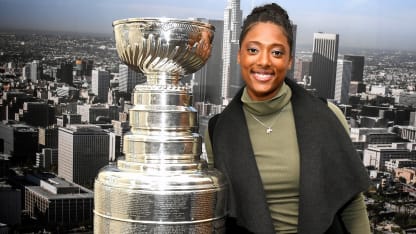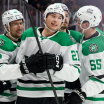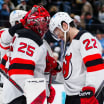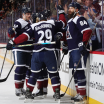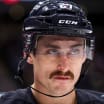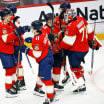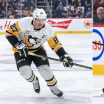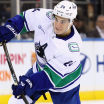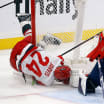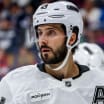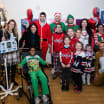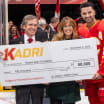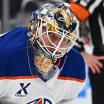Blake Bolden keeps breaking down barriers.
A standout for the women's hockey team at Boston College, where she ranks sixth all-time among defensemen in scoring with 82 points (26 goals, 56 assists), Bolden became the first black woman selected in the first round of Canadian Women's Hockey League Draft (No. 5 by the Boston Blades in 2013) and the first to play in the National Women's Hockey League (with Boston in 2015).
And after the Los Angeles Kings hired Bolden as a pro scout in January, she's believed to be the first black female pro scout for any NHL team.
For Bolden, it's special.
"I guess when I live my life and just decide to make these choices and these advances in my career, I don't necessarily think about it until someone tells me that it's something I've achieved," Bolden said. "Then I have to take a step back and think about it and think, 'Wow, this is so incredible.' I think about, in my future, when I'm 60, 70 years old and I'm looking back, and I see way more color in the NHL, in the offices and executive positions, girls playing hockey who are colorful, all different types of races, it's just going to be really amazing and I think I'm just going have so much pride when I see that when I'm older. I have pride now just talking about it. But every single girl, we're all so passionate about growing the game, and it's just another thing that we can say we're helping to do."
Here are Five Questions with… Blake Bolden:
Was scouting something you thought was a possibility at some point in your life?
"No. I had no idea that it was even an option. I guess because I didn't see it [women in scouting], I didn't really think of the potentiality of becoming a scout. I'm not someone who's making a three- and a five-year plan. I'm someone who likes to just take all of her options and then make a decision based off the situation. I truly believe that everything happens for a reason. I think that my encounter with [Kings president Luc Robitaille] was serendipitous. Just like, 'Yep, you're supposed to do this. You're going to try it out and you're going to love it, hopefully.' And I've been doing it for a couple of months and the Kings have been just so helpful in making sure that everything's good, I understand everything, I'm doing OK, I'm comfortable. And obviously with all the media going around the situation, with Black History Month [in February], it's been crazy but also exciting. Yeah, I'm enjoying it right now."
How did the meeting with Robitaille transpire?
"I'm pretty close with Renee Hess, the founder of Black Girl Hockey Club. She lives an hour north of San Diego, and she was going to a Kings game and I was like, 'Renee, I'd love to join you all,' because I'd never been able to join in on the Black Girl Hockey Club fun and it was only a couple of hours north. She said, 'Yeah, it's a great idea, you can be a special guest, it'll be so much fun. We have Lincoln Brown, a girl who plays for the L.A. Lions (12UAA1 team] coming, and it would be so great for you all to meet.' So that was my whole thing of going. I had no clue what was ahead.
"So I went to the game and Luc being the awesome president he is, he comes down to introduce himself to the group and to say hello to everyone. Our conversation continued from there, and he just casually asked me if I was interested in scouting. I was kind of shocked because I wasn't expecting anything like that. He just said, 'Here's my email: remember it. It's very easy.' And I just tried to remember it because, I was not only just super excited that he presented this thought of a potential opportunity, but that I was also meeting Luc Robitaille. I just had to just stop and take a deep breath and then come back to it. They had me come up [to L.A.], see a game, meet all the guys in the front office. I got to know Nelson [Emerson], who is head of player personnel and my direct supervisor. Everyone was just really nice. At first, they had to see who I was and kind of get a feel for it. Then I came up for official interview and went over game film that I analyzed, told them about my goals in the future and how the Kings could be a great fit for me and my life. They were looking for a Pacific scout because they didn't have one, and it kind of seemed that this was a really good fit."
How were the first few weeks of the job?
"I mean, when you start any job you're just like, 'Oh my God, I cannot mess up.' So I was super diligent with all of my notes. I'm an organized person as is, so I created this whole word document, so I can organize all the players and all of their skills in each zone. I have this grid and I still use it now. I'm just really happy; it's just watching hockey, you know? I'm watching hockey, I know the players I'm supposed to be looking at, I'm aware of the game because I've been playing it. I was a fan, and I'm a player and now I'm a scout. So, it's just little shifts in how I look at the game, but it's still just hockey. I'm trying to learn as much as I can from the other scouts that have also been super helpful, and I have a million questions. My first funny mistake, I flew up to San Jose but didn't let the San Jose security guys know I was coming. I showed up and they were like, 'Who are you, why are you here?' I said, 'I'm a scout.' It's just little things like that; you have to know what to do, and who to reach out to, to make things happen. It was really comical. They let me in; they let me scout the game. There are just levels to it."
